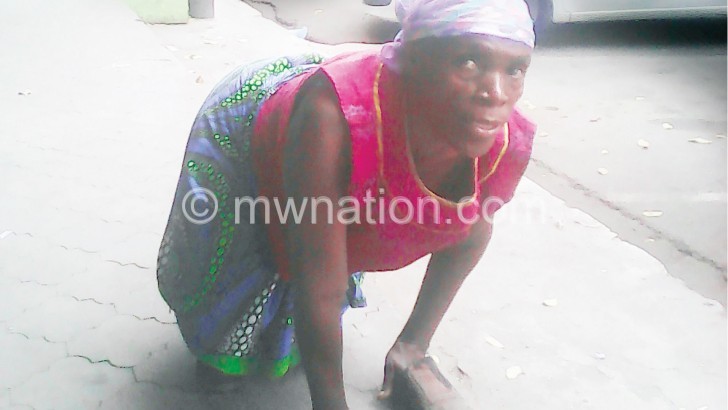Begging to educate children
The streets of Blantyre, Lilongwe, Zomba and Mzuzu offer travellers numerous encounters with people with disabilities begging.
However, the sights are sporadic beyond the major cities.
Although most street beggars dress shabbily, Janet Chinthenga paints a totally different picture.
On a sunny Wednesday afternoon, we met her walking on all fours in the corridors of Lambat’s Shop in Blantyre.
She was neat, evoking many questions.

In an interview, the woman, from Namadzi in Zomba, narrated her story: “I am out begging to maintain my business and keep children in school.”
She was born without any disability, but became paralysed 39 years ago.
“At seven, l fell sick and I couldn’t stand up or walk. l was paralysed and started crawling. The disability started with one leg. In no time, both legs were paralysed,” she says.
Chinthenga is now 46. She went to St Mary’s Secondary School in Zomba.
In 1988, she followed her husband to Blantyre and started selling dry fish and tomatoes in her home in Namiyango when he persuaded her not to get a job.
This reduced her to a housewife tasked to raise their children.
Unfortunately, she feels cheated as the man dumped her reportedly after collecting his retirement payout at Malawi Council for the Handicapped (Macoha) in 2006.
This left her with the burden of raising five children single-handedly.
Chinthenga was introduced to street begging in Limbe by her friend, who also has a physical disability.
“I detested the idea of hitting the streets to beg. I felt ashamed. With time, it has become part of life,” she explains.
Some urge against giving alms when confronted by street beggars, arguing it makes them lazy.
Others argue that beggars spend their earnings on liquor and transactional sex.
But Chinthenga invests her earnings in a roadside fish business in her home.
“I survive by selling some tomatoes, dried fish and eggs near my house,” she says.
Chinthenga uses the proceeds from the small-scale business to buy food and pay school fees for her children.
“I am struggling to keep them in school. My firstborn is currently at Blantyre Teachers College and the other four go to various secondary schools,” she explains.
Chinthenga is determined to use her meagre earnings to ensure every child learns.
She owns a house connected to the national electricity grid so that her children can study even at night, she says.
But she highlights the difficulties faced by street beggars: scornful names, daylight robberies and being harassed by street children.
“I will never forget the day I was slapped in the face by a street boy just because I refused to release the money I had collected that day,” she narrates.
The woman was trained in tailoring by Macoha.
She envisages the skills helping her stop crawling on the streets of Blantyre and Limbe to concentrate on her tailoring and selling goods in her township.
“If only I had a sewing machine, I would be working at one place instead of crawling all over town as a beggar,” she pleads.
Biston Macheso, the bishop of Ladders to Heaven Church at Mthandizi in Bangwe Township, urges well-wishers to gather together the constrained beggars and provide them with necessary support so that they do not feel sidelined or like second-class citizens in society.
Macheso encouraged people of goodwill to assist the needy, saying: “Fortunately, Chinthenga already has some capacity of running a business such as tailoring and selling some commodities. She needs a financial boost.





